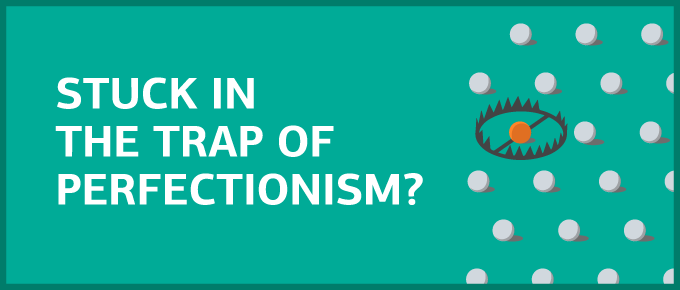Perfectionism is Killing us: How Can We be More Ordinary, More Normal?
Let us hope that one day we will all rise to the challenge of seeing and noting the beauty of the imperfect and the imperfection, the impermanent and the incomplete. And that, all said and done, “good” is truly “good enough.”
 Photo:slideshare.net
Photo:slideshare.net
This posting is dedicated to all those suffering from the epidemic rise in the hallucinating ‘Perfectionism’ illness, especially the Generation Z (Gen Z), who are also called 'digital natives'—the first generation to grow up with the internet as a part of daily life, which comprises people born between 1996 and 2010. This generation’s identity has been shaped by the digital age, climate anxiety, a shifting financial and employment landscape, COVID-19 and the damaging rise in 'perfectionism.'
They now have become enslaved and entrapped in the age of obsessive technology addiction, social media, Facebook, WhatsApp, Instagram, Twitter, TikTok and Snapchat, amongst others, roaming and surfing 24 hours a day, always plugged in, suffering from debilitating insomnia, unable to dream about beauty and a better tomorrow, always stimulated with falsehoods, being told to chase and strive for perfection in all they do and how they look. It is so tragic and heartbreaking to witness that Poor mental health, eating disorder, anorexia, self-harm and in some cases suicide attempts have become part and parcel of Gen Z lives and existence in many parts of the world.
May the lessons noted and learnt below, become a light of hope to them that chasing ‘Perfectionism’ is nothing but a soul-destroying illusion and that instead of falling for what can never be achieved, they should focus on the things that will bring them true health and happiness.
Moreover, may they begin to value and enjoy, like the rest of us- the so-called ‘Recovered Perfectionists’- the Simple Pleasures of Life and be happy to be Ordinary and Normal, becoming the desciples of the ‘Good Enough’ way of life, and enjoying The Joy of Less. Carpe diem!
“In order to go on living one must try to escape the death involved in perfectionism.” — Hannah Arendt
‘Overcoming Perfectionism: Don’t Let Perfect Be the Enemy of Good.’

Photo: YouTube
Simple Pleasures of Life: The Wonders and Beauty of an Ordinary Life-
Celebrating the Art of Imperfection
‘Forget your perfect offering/There's a crack in everything/That's how the light gets in." This isn't merely "accepting" imperfection, as countless lifestyle gurus would have us do. The imperfection is the point.’-Leonard Cohen
“One of the basic rules of the universe is that nothing is perfect. Perfection simply doesn't exist.....Without imperfection, neither you nor I would exist”― Stephen Hawking
‘We live in an age with a high regard for extraordinary lives – that is, lives that the vast majority of us will never lead. Our heroes have made outsized fortunes, appeared on gigantic screens and demonstrated unique virtue and talent. Their achievements are both dazzling and continuously, in the background, humiliating.
In the late 1650s, the Dutch artist Johannes Vermeer painted a picture called The Little Street. Doing so was a quiet but momentous and revolutionary act, with an impact that challenges our values to this day.
‘It showed nothing more outwardly impressive than an ordinary street in Vermeer’s home town of Delft. Someone was doing a little sewing; some kids were playing on the stoop, a woman was busy in the yard. It is one of the greatest paintings in the world.
‘Up to this point, the most prestigious cultural works had emphasised the merits and value of aristocratic, military and religious lives, that is, of lives filled with extraordinary moments and advantages. The great epic poets, Homer and Virgil, had written of heroic warriors; Renaissance artists had produced magnificent visions of saints and angels.
‘And the routines of kings, queens and aristocrats were constantly celebrated and held up for admiration on the most prestigious canvases.
‘But Johannes Vermeer went in another direction. He wanted to show us what could be appealing and honourable about very different sorts of activities: keeping a house tidy, sweeping the yard, babysitting, sewing or – as in his equally significant painting of a kitchen maid – preparing lunch’...Continue to read
Trapped in the Web of Perfectionism?
 Photo: Li Wang via Smithsonian Magazine
Photo: Li Wang via Smithsonian Magazine
‘Overcoming perfectionism can greatly improve your quality of life. By letting go of rigid expectations, you become open to life’s unexpected opportunities, so you can find ways to actively create the life you want.’ - Lyn Christian, founder, SoulSalt Inc.
‘The rise of perfectionism – and the harm it’s doing us all.’
An article by Will Coldwell, reflecting on his interview with Prof. Thomas Curran author of ‘The Perfection Trap:The Power Of Good Enough In A World That Always Wants More.’- More on this later.
Let us hope that one day we all rise to the challenge of seeing and noting the beauty of the imperfect and the imperfection, the impermanent and the incomplete. And that, all said and done, “good” is truly “good enough.”
My own Struggle with the Toxic Illusion Of Perfectionism

Photo: GETTY/ Via Forbes
To my mind, looking back at my life, Good Enough is Enough and is Great, Perfect indeed!
N.B. I read Will Coldwell’s interview with Prof. Thomas Curran a few times, and I read it very carefully. The more I read, the more I noticed that, deep down, it very much resonates with me. It got me thinking, travelling back in time, and made me think that I should open up, open my heart and say it as it was.
I have not talked about my struggles with perfectionism before. But I think I must, given the rise in the perfectionism epidemic, which is affecting the physical and mental health and wellbeing of so many people, young and old, around the world.
Looking back on my life, from when I was a teenager into my 20s and 30s, perhaps even longer, I was struggling with life, what it means and what it entails. I was always stressed, anxious and fearful. I wanted to be perfect!
I wanted to be a perfect son, brother, grandchild, and friend. I wanted to be a perfect pupil and student. I always wanted to be noted for my perfection. I wanted to be the best. Perfect exam results. Perfect at sports. I just wanted to be perfect in everything under the sun!
Then there was my upbringing and the Persian culture, where the oldest son is the prince, the king in waiting, who must be perfect, highly achieved and successful, worthy of his future position, acting as the role model for his younger siblings, ensuring the family’s honour and good name.
I don't know if you can imagine my pain, anguish and disappointment of not reaching the heights my culture had set for me. I wanted to be me, but I also wanted to be somebody, or something else.
All said and done, the harder I tried to be perfect, the less I was ‘perfect’, the less I was achieving, and the less I was successful, and the unhappier I became, resulting in the vicious cycle of nothingness, hopelessness and despair.
Although, to some extent I was able to hide all these and project a different persona, only I knew that underneath I was on fire, burning out before I had even started!
This carried on for quite a long time. When I started university, I gave up. When I started a job, I gave up. Jumping from branch to branch, never gathering roots, never becoming confident and strong.
I was always afraid of making mistakes, fear of disapproval, fear of failure, and fear of not meeting impossible standards and unattainable goals I had set for myself, all to avoid or minimise shame, blame, and judgement.
All in all, nothing was good enough for me! How could it, when it was not perfect for a perfectionist like me!
I was very lucky when I met a girl who later on became my wife. She taught me something that nobody had taught me before, namely the wisdom, beauty and the healing powers of ‘GOOD ENOUGH’ accepting myself as who I am and trying to do things to the best of my abilities, trying to be more ordinary and normal.
I recall her telling me this harmful stride for being perfect has imprisoned me like a bird in a cage, killing my creativity, positivity and hopefulness, which I had to free myself from its poisonous hold on me.
I cannot be more grateful for that guidance. With that under my belt, I have gone places, I have achieved goals, which for decades had eluded me, and I hope in the process I have honoured all those whom I know have always loved me, wishing me happiness, peace and contentment for who I am and who I have become. They know who they are and I love them.
And now, reverting back to the said interview.
'The rise of perfectionism – and the harm it’s doing us all'

Photo:SoulSalt
‘Perfectionism is an attempt to get ahead in a culture that tells us who we are is never enough’
‘Many of us believe striving for perfection leads to success. But perfectionism is counter-productive and can result in soaring levels of stress.’
At the end of the day, ‘the most powerful thing we can do is see the flaws in the system, accept ourselves for who we are – not what we have or achieve, and believe that there is such a thing as “good enough”. Life, after all, is imperfect.’- Thomas Curran
‘About a decade ago, Thomas Curran, a psychology student, travelled to Australia to embark on a postdoctoral fellowship and was crushed with anxiety, exhaustion and panic attacks. Beyond making the round-the-world flight, he’d really pushed himself hard to make it there. Curran is from Wellingborough, a town in the east Midlands, and grew up “without much money”. His mum used to work as a receptionist at the Hind Hotel, his dad was a construction worker who was famous locally (Curran tells me with a touch of pride) for riding the statue of a deer mounted above the hotel’s entrance. As a teen, Curran thought he’d go into construction, too, but spurred on by the New Labour education drive, he chose university. Now he was far beyond the expectations of his youth – and surely well on the road to success in academia – yet found himself in pieces: “a failure”.
‘With all going south Down Under, Curran returned to the UK. At a less prestigious institution, the pressure eased. He dropped his competitive streak and decided “to stop trying to please other people”. Able to let his mind wander, he began to look more forensically at perfectionism, a trait he recognised in himself and – until that point – had rather celebrated. After all, surely it was perfectionism that enabled him to meet the high standards he placed upon himself and rise from his working-class roots? And surely it was the same impulse that kicked him out of bed when he felt crushed by self-criticism, and pushed him through panic attacks to keep striving? “I was genuinely of the belief that perfectionism was the one thing that was holding me up when everything around me was collapsing,” he says. “But it was actually perfectionism that was creating those problems.”- Continue to read
A Must-read book by Thomas Curran
The Perfection Trap
The Power Of Good Enough In A World That Always Wants More
‘When did 'good enough' become the same as 'perfect'? Why does society increasingly promote ideals that are completely unrealistic? And what does it mean for all of us that perfectionism is on the rise?
In The Perfection Trap, you'll discover what's really driving the rise in perfectionism, its impact on how we learn, work, parent and relate to ourselves and each other. From the personal to the impact on the economy, grounded in over a decade of research and filled with real stories, this timely book reveals how our quest for perfection impacts our health and mental well-being and promises practical techniques and policy proposals to help us break free of the perfection trap.’
Discover more and buy the book HERE
Perfectionism, Good Enough and more: A pick from our archive
Time to Weave a New Tapestry of Life

Photo:Joshua Woroniecki
(I strongly believe that my recovery and healing from my perfectionist episodes, has somehow become a catalyst for who I am and what I do , underpinning my academic beliefs, writings and research)
How Much is Enough? Money and the Good Life (2013)
Enough is Enough: The economics of enough (2013/2023)
The Super-rich and the Politics of Envy (2013)
In Praise of Frugality: Materialism is a Killer (2014)
The Joy of Less (2014)
Small is Beautiful: The Wisdom of E.F. Schumacher (2011/2015)
An Open Letter to University Leaders: Students’ Mental and Emotional Wellbeing Must Be Our Priority (2015)
A Plea to address Global Youth Depression (2015)
Hello Fat Cats! Do you fancy a dialogue for the Common Good? (2016)
Success-What is it and is the drive to achieve it making our children sick? (2016)
Neoliberalism and the rise in global loneliness, depression and suicide (2016)
Economic Growth: The Index of Misery (2018)
What is Money? Is it Money Money Money, Must be funny? (2018)
Happiness is to Do Nothing (2018)
The Secret of Success is Idleness: Less is More! (2018)
The Art of Living a Happier life: Solitude- The Most Important Skill Nobody Taught You (2018)
Student Suicides at Bristol University: My Open Letter to the Vice-Chancellor, Prof. Hugh Brady (2018)
Why Happiness Should be Taught at Our Universities (2011/2019)
The beauty of living simply: the forgotten wisdom of William Morris (2019)
Simpler life and simpler times: A Journey in Life (2019)
University students are crying out for mental health wellbeing modules (2019)
“In a world where you can be anything, be kind.” (2020)
What if Universities Taught KINDNESS? (2019)
Is Neoliberal Economics and Economists 'The Biggest Fraud Ever Perpetrated on the World?' (2020)
The Broken Economic Model and the Inhumanity of the Lost Decade of Austerity (2020)
Eruption of anxiety, depression and suicide in Britain (2020)
In these troubled times let us be ordinary and enjoy the simple pleasures of life (2019)
The scar on the conscience of Britain: The neglect of its children, youth, students and more (2019)
The Beauty and Wisdom of being Ordinary (2019)
Life is too short not to live it simpler (2022)
Journey to Healing: Let Me Know What is Essential (2022)
GCGI is our journey of hope and the sweet fruit of a labour of love. It is free to access, and it is ad-free too. We spend hundreds of hours, volunteering our labour and time, spreading the word about what is good and what matters most. If you think that's a worthy mission, as we do—one with powerful leverage to make the world a better place—then, please consider offering your moral and spiritual support by joining our circle of friends, spreading the word about the GCGI and forwarding the website to all those who may be interested.

Photo:Joshua Woroniecki
